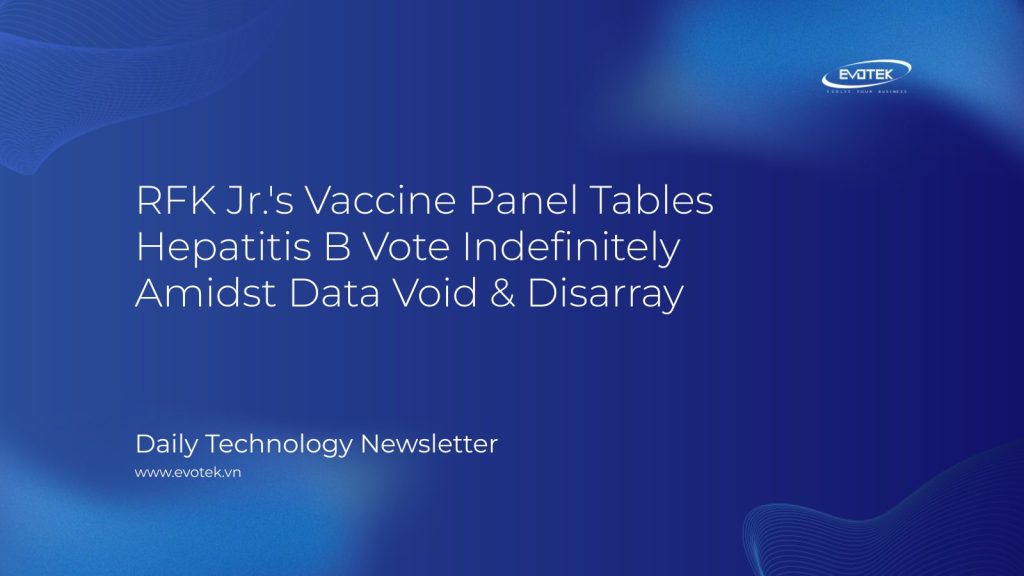A panel of federal vaccine advisors, notably influenced by anti-vaccine activist Robert F. Kennedy, Jr., concluded a dramatic two-day meeting grappling with fundamental questions and a striking absence of scientific data. The Advisory Committee on Immunization Practices (ACIP) ultimately postponed a crucial vote on universal Hepatitis B vaccination for newborns, citing confusing language and a lack of evidentiary support for proposed changes.
MMRV Recommendation Reversal Highlights Internal Confusion
The second day began with a surprising reversal. The panel revisited a previous day’s decision regarding federal coverage for the measles, mumps, rubella, and varicella (MMRV) vaccine. Originally, the group had voted to restrict access, removing recommendations for MMRV use in children under age four – a move made without any new data. This decision initially passed with an 8-3 majority.
Compounding the confusion, they then voted to maintain access for children under four receiving free vaccines through the federal Vaccines for Children (VFC) program. This created an illogical discrepancy, suggesting that safety concerns for the general population somehow didn’t apply to low-income, vulnerable children covered by VFC. Today, Kennedy’s ACIP corrected course, voting 9-0 to align VFC coverage with their earlier decision to strip the MMRV recommendation for young children, further highlighting the inconsistent decision-making process.
Hepatitis B Vaccine Vote Stalls Over Data Gaps
Next on the agenda was a highly anticipated vote that had been skipped the previous day: a proposal to modify the recommendation for the universal birth dose of the Hepatitis B vaccine. Currently advised universally on a baby’s first day of life, the proposed change would delay the initial dose for at least one month, unless the mother tested positive for the virus. This modification, if passed, would open a critical window for infection by a highly infectious disease that can lead to chronic liver disease and cancer.
Cracks in the plan quickly emerged. Several panel members voiced strong concerns, noting the proposed recommendation “made no sense” and was based on “zero data.” Psychiatrist Joseph Hibbeln questioned the lack of comparative safety data between administering the vaccine at birth versus one month later, especially for infants of Hepatitis B-negative mothers.
Adam Langer, Acting Principal Deputy Director of the CDC’s National Center for HIV, Viral Hepatitis, STD, and Tuberculosis Prevention, underscored the vaccine’s established safety profile. He emphasized that there are no safety concerns for administering the dose at birth, with adverse effects being rare and mild, such as anaphylaxis occurring in only 1.1 cases per 1 million doses.
The Critical Importance of the Universal Birth Dose
Langer provided a clear rationale for the birth dose. Hepatitis B is highly infectious, spreads via bodily fluids, can survive on surfaces for days, and even microscopic amounts can cause infection. The risk of developing a chronic infection, which can lead to severe liver conditions and premature death, significantly increases the younger a person is when infected. Newborns infected at birth from their mothers face a 90% chance of chronic infection, with 25% dying prematurely.
Crucially, up to 16% of pregnant women in the U.S. are not tested for Hepatitis B during pregnancy. Furthermore, unvaccinated infants can contract the virus from family or community members; studies showed 7% to 11% of U.S.-born children to immigrant mothers were infected despite their mothers testing negative. Since ACIP recommended universal Hepatitis B vaccination at birth in 1991, acute cases have plummeted from approximately 18,000 to around 2,200 in 2023.
Panel discussions veered towards downplaying the risk of community exposure, assuming doctors could assess family risk, and striving for 100% maternal testing – all without robust data to support these assumptions or changes. Langer succinctly summarized the scientific void: “The only thing that we’re discussing here is if there’s some benefit or removal of harm that comes from waiting a month. And I have not seen any data that says that there is any benefit to the infant of waiting a month, but there are a number of potential harms to the infant of waiting a month.”
“Trust” Over Safety: The Role of Misinformation
Amidst the data vacuum, panel member Robert Malone, known for false claims about COVID-19 vaccines, explained that the push to change the Hepatitis B recommendation was not due to safety concerns, but rather a perceived “loss of trust” among parents exposed to vaccine misinformation.
“The signal that is prompting this is not one of safety, it is one of trust,” Malone stated. “It is one of parents uncomfortable with this medical procedure being performed at birth in a rather unilateral fashion without significant informed consent at a time in particular when there has been a loss of trust in the public health enterprise and vaccines in general.”
Vote Indefinitely Tabled
The morning’s deliberations reached a head with the presentation of the proposed voting language for the Hepatitis B recommendation, which stated: “If a mother tests [hepatitis B]-negative: The first dose of the Hepatitis B vaccine is not given until the child is at least one month old. Infants may receive a dose of Hepatitis B vaccine before one month according to individual based decision-making.”
This phrasing immediately drew criticism for its confusing and contradictory nature. Psychiatrist Hibbeln noted, “You can’t say don’t give it and then give an opportunity to give it.” With questions mounting about the complete absence of data for the proposed recommendation, a motion to table the vote indefinitely passed swiftly, 11-1, with only ACIP chair Martin Kulldorff dissenting.
The panel’s struggles underscore significant challenges when vital public health decisions confront a lack of scientific rigor and an undercurrent of vaccine skepticism.

 日本語
日本語 한국어
한국어 Tiếng Việt
Tiếng Việt 简体中文
简体中文